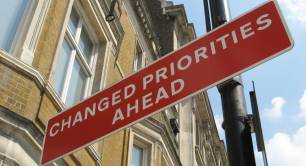Charities: “Don’t have a love-in with government” says Kerslake
At NPC Ignites on 12 October we sat down for a chat with Lord Kerslake, the chair of King’s College Hospital NHS Foundation trust and a former head of the civil service.
Kerslake had just delivered a speech entitled A View from Whitehall in which he had let delegates, most of whom were from the charity sector, know just how they were perceived by government.
There were positives and negatives for them to hear. While admitting that, “a single unified perspective doesn’t exist,” he related that “Whitehall generally has a positive view of the voluntary and community sector,” and that “it is seen as a force for good.”
However, “the sector is rarely the first thing that comes to a minister’s or official’s mind when developing policy,” said Kerslake, who was head of the civil service from 2012 to 2014.
You don’t want to needlessly antagonise government but you don’t want to kowtow to them either
Contracts now make up £11bn of the £13bn that government spends with UK charities per year and Kerslake urged the voluntary sector not to let the value of those agreements affect its lobbying activities. “They respect those who challenge; the campaigning role of the sector is vital,” Kerslake said.
He lobbied for an “open, professional, respectful” relationship but warned the voluntary sector: “don’t have a love-in”.
Kerslake, who was Sir Bob Kerslake before he was appointed a crossbench life peer in 2015, expanded on this theme with Pioneers Post. Citing the sometimes fraught relationship between housing associations and government since MPs decided that grants would only be given if housing associations also built houses to sell, Kerslake said the relationship between the charity sector and government was just like any relationship.
“What I’m trying to encourage people is not to obsess about that. It’ll go through its ups and downs. You don’t want to needlessly antagonise government but you don’t want to kowtow to them either.” His reason for giving the speech was because he wanted to urge the sector to think more confidently about what they could achieve, he explained.
The charity sector has been bruised in the last year following the revelations that emerged in the wake of the Kids Company closure and the consequent scrutiny that exposed controversial practices. Given the cosy relationship Kids Company enjoyed with Whitehall, Kerslake thinks the story is as much about the government as the charity sector, but he does see the story as a wake up call for charities.
“The sector needs to constantly work at the basics of good governance and financial control and it can’t regiment all the organisations in the voluntary and charity sector. But it can play a role in setting out what 'good' looks like and in helping organisations stay in the right place,” he says.
For him, if things go awry, it’s the trustees that are to blame. “Governance is difficult in big organisations. We see public sector and private sector organisations stray from the path, so for a smaller body the risks are there and you have to be alert to them. You have to have a healthy, constructively challenging environment within the board. If I have ever seen it go wrong, it’s because that bit has not happened.”



